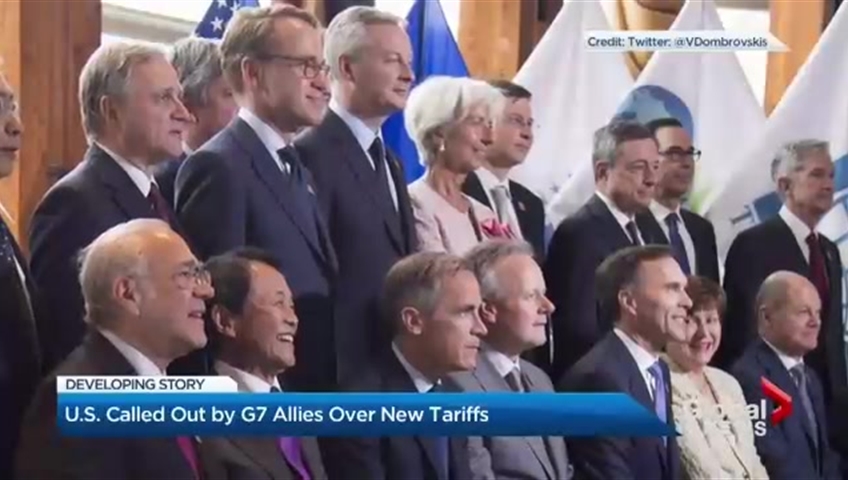Tariffs Overshadow G7 Finance Ministers' Meeting Conclusion

Table of Contents
The Impact of Tariffs on Global Economic Growth
The imposition of tariffs, essentially taxes on imported goods, significantly contributes to uncertainty in the global market and hinders economic growth. These trade barriers create a ripple effect throughout the global economy, impacting various sectors and stakeholders.
-
Increased prices for consumers: Tariffs directly increase the price of imported goods, leading to higher consumer prices and reduced purchasing power. This can particularly impact low-income households who spend a larger proportion of their income on essential goods.
-
Reduced international trade volumes: The imposition of tariffs discourages international trade as businesses become less inclined to import goods subject to higher taxes. This reduction in trade volumes directly impacts economic activity and growth.
-
Negative impact on supply chains: Global supply chains rely on the seamless flow of goods and services across borders. Tariffs disrupt these chains, increasing costs and creating delays, ultimately affecting the efficiency and competitiveness of businesses. This can lead to shortages and higher production costs.
-
Retaliatory tariffs escalating tensions: When one country imposes tariffs, other nations often retaliate with their own, leading to a trade war and escalating tensions between countries. This tit-for-tat cycle of tariffs significantly damages global economic relations.
For example, the US-China trade war, characterized by the exchange of significant tariffs, resulted in reduced trade volumes between the two economic giants, impacting global growth and supply chains significantly. The World Trade Organization (WTO) estimates the cost of this trade war in the billions of dollars. Such economic sanctions through tariffs create instability and fear in the global market.
Disagreement Among G7 Nations Regarding Tariff Policies
The G7 meeting revealed stark disagreements among member nations regarding the use of tariffs as a trade tool. The debate centered around the balance between protectionist measures and the benefits of free trade.
-
Free trade vs. protectionism: Countries like Canada and Japan advocated for free trade agreements and lowering tariffs, emphasizing the mutual benefits of open markets. Conversely, countries employing protectionist measures, often using tariffs to protect domestic industries, created friction in the discussions.
-
Specific instances of disagreements: Several instances during the meeting highlighted this divergence. Discussions around steel and aluminum tariffs, for example, sparked heated debate, revealing deep divisions among G7 members regarding the appropriate use of these trade barriers.
-
Political implications: The disagreements on tariffs have significant political implications. The use of tariffs often becomes intertwined with broader geopolitical strategies and national interests, making compromises and consensus-building challenging. These disagreements also impact trust and cooperation on other economic and diplomatic fronts. This relates directly to the lack of strong, unified action on global economic issues beyond the tariff debate.
The Role of the US in the Tariff Debate
The US played a pivotal role in shaping the G7 discussions on tariffs. Its historically protectionist stances and imposition of significant tariffs on various goods significantly impacted the overall negotiations.
-
Impact of US tariff policies: US tariff policies, particularly under recent administrations, have been a major source of friction with other G7 nations. These policies have led to retaliatory tariffs and increased trade tensions.
-
Resolving trade tensions: Finding strategies for resolving trade tensions involving the US is crucial for fostering global economic cooperation. This requires a diplomatic approach that addresses both the economic and political dimensions of tariff disputes.
-
Future implications of US trade policies: The future direction of US trade policies under future administrations will significantly influence the global trade landscape. Continued protectionist measures could hinder multilateral efforts to reduce tariffs and promote free trade.
Alternative Solutions and Future Prospects for Trade Cooperation
The G7 meeting acknowledged the need for alternative solutions to address concerns around tariffs and foster global trade. While concrete solutions remained elusive, some potential avenues were discussed.
-
International cooperation and regulatory frameworks: Strengthening international cooperation through organizations like the WTO is essential for establishing clear rules and regulations governing the use of tariffs. This includes reinforcing existing mechanisms for resolving trade disputes.
-
Multilateral agreements: Negotiating and implementing comprehensive multilateral agreements to reduce tariff barriers and promote trade liberalization remains crucial. Such agreements would need the cooperation and commitment of major economic players.
-
Future outlook: The future of global trade heavily depends on resolving existing tariff disputes and fostering a greater commitment to multilateralism. A failure to address these issues could lead to further fragmentation of the global economy and hinder overall growth. The potential for successful trade liberalization is directly tied to the willingness of nations to engage in good-faith negotiations and avoid escalation of trade wars.
Conclusion
The G7 Finance Ministers' meeting highlighted the significant impact of tariffs on global economic stability and cooperation. The lack of consensus on tariff policies underscores the challenges in achieving a harmonized approach to international trade. Disagreements, particularly concerning the role of the US, cast a long shadow over future collaborative efforts.
Call to Action: Understanding the implications of tariffs is crucial for navigating the complexities of the global economy. Stay informed about developments in international trade and tariff policies to better understand their impact on your business and the global market. Learn more about the evolving landscape of global tariffs and their consequences by [link to related article/resource].

Featured Posts
-
 Ccmf 2025 A Record Breaking Sellout
May 26, 2025
Ccmf 2025 A Record Breaking Sellout
May 26, 2025 -
 5 Delicious Shrimp Dishes In The Hudson Valley
May 26, 2025
5 Delicious Shrimp Dishes In The Hudson Valley
May 26, 2025 -
 Hoka Cielo X1 2 0 Review Lightweight Rocker For Speedier Runs
May 26, 2025
Hoka Cielo X1 2 0 Review Lightweight Rocker For Speedier Runs
May 26, 2025 -
 Apple Ceo Tim Cook A Difficult Year Continues
May 26, 2025
Apple Ceo Tim Cook A Difficult Year Continues
May 26, 2025 -
 Flash Flood Emergencies A Guide To Survival And Prevention
May 26, 2025
Flash Flood Emergencies A Guide To Survival And Prevention
May 26, 2025
